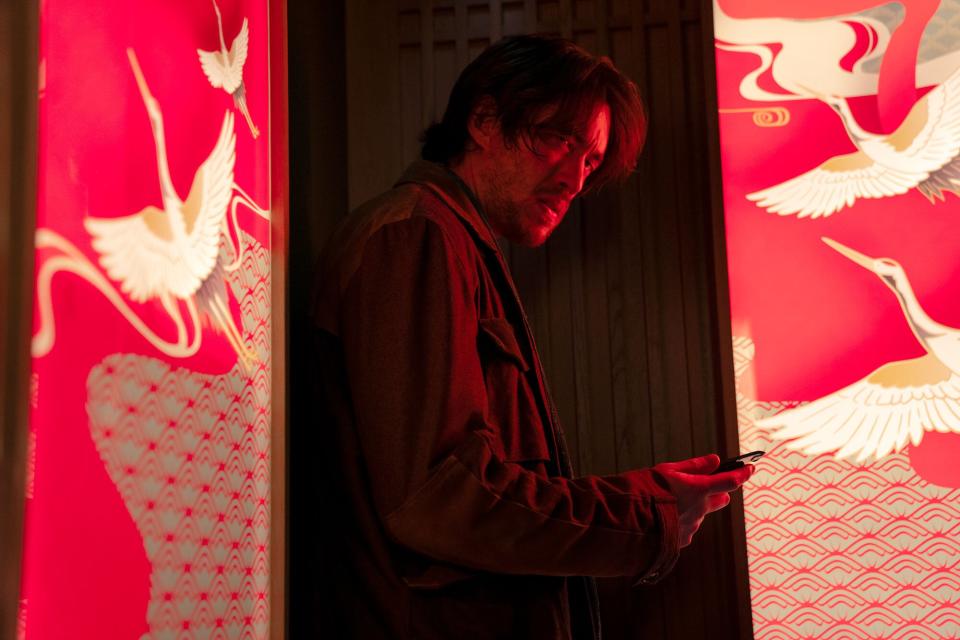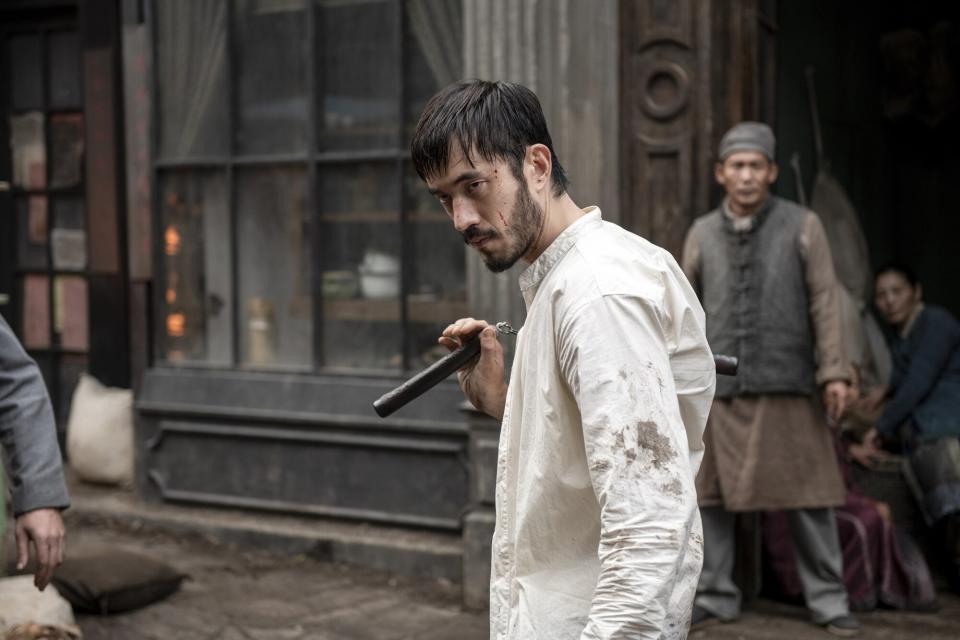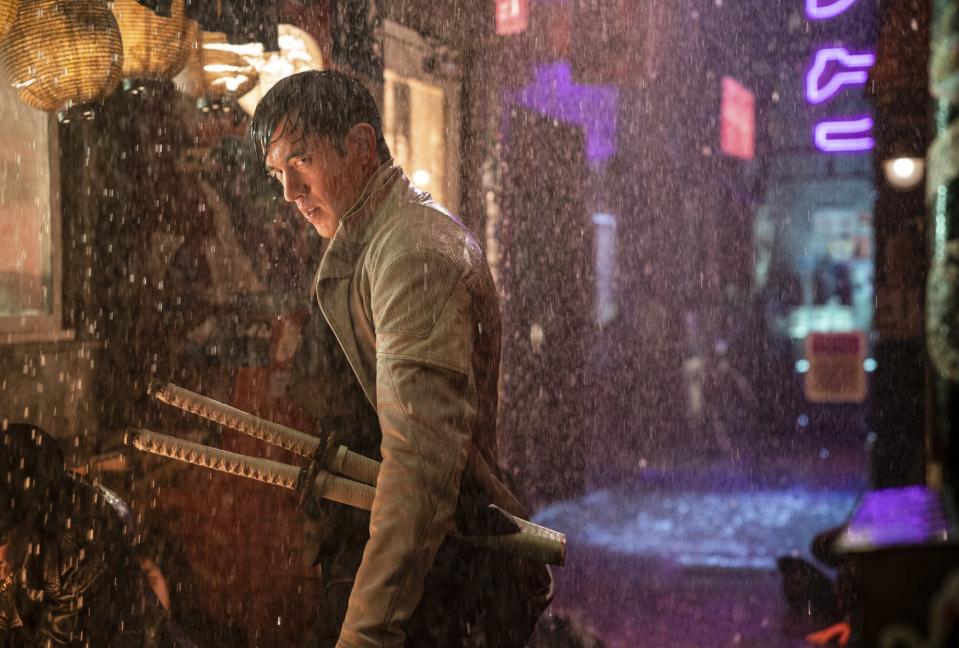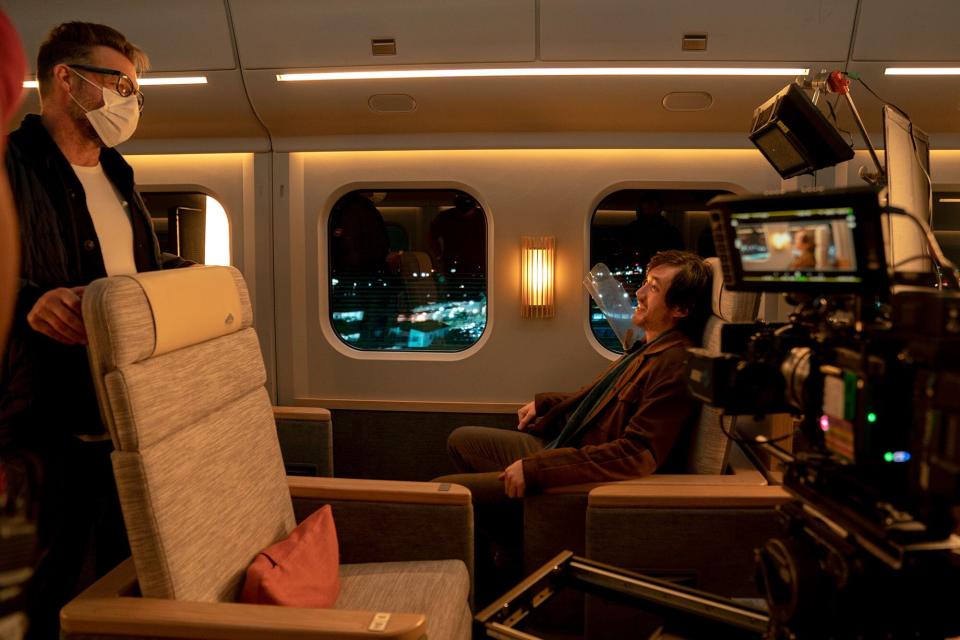Bullet Train breakthrough Andrew Koji gets candid on Snake Eyes , Warrior , and Hollywood
- Oops!Something went wrong.Please try again later.
- Oops!Something went wrong.Please try again later.
The ice machine is starting to get to Andrew Koji in his new apartment in South Africa. It's hard to hear it over Zoom; the noise comes through as a succession of light taps in the background, like a fingernail rapidly prodding a computer screen. But Koji, 34, says it's way more intrusive than that: "It's just annoying to me because it's like…" He shakes his hands around his ears. But Koji is willing to suffer for his art.
The actor has a nice spot in Cape Town — he calls it "this fancy place" — for the next few months while he makes the third season of Warrior, a show once axed at Cinemax and later saved by HBO Max. (Although these days with the Discovery merger, who knows what will happen.) It's been about three years since Koji last worked on the Bruce Lee-inspired action drama, and he says it feels strange to be back. He's not the same actor anymore. He's not the same person, either.
In season 1, Koji felt the pressure of being "an untested commodity" as a fresh-faced leading man of a prominent series. "I very much had eyes on me and directions telling me, 'Do this, do that,'" he remembers. The Japanese-English actor has since starred opposite Henry Golding in a franchise film, Snake Eyes: G.I. Joe Origins (he admits the script was "awful"), and he now has a breakthrough role in Bullet Train as Kimura, a mysterious gentleman on a mission who boards a high-speed locomotive filled with multiple assassins.

Scott Garfield/Sony Andrew Koji's Kimura boards the 'Bullet Train,' a film about a bunch of assassins riding a high-speed locomotive.
Even among a sea of A-listers, including Brad Pitt and Sandra Bullock, Koji's performance cuts through. These days, two years after he shot Bullet Train near the start of the COVID-19 pandemic, he feels like he has more agency. Not just that — he's more relaxed.
Koji thinks back to the beginnings of Warrior. "I used to really give myself a hard time," he says. "Warrior is a very demanding job. It's tough on the body and the workload is a lot. I used to have sleepless nights, man. I think I burned myself to the ground."
After watching how other stars, like Pitt and Bullet Train's Hiroyuki Sanada, bear the weight of the work, as well as certain realities of moviemaking in Hollywood, Koji says he's better able to find a balance. "I'm definitely trying to enjoy the ride a bit more," he adds.
See below for EW's conversation with Koji.
ENTERTAINMENT WEEKLY: You're calling from South Africa, right?
ANDREW KOJI: Cape Town, yeah, filming Warrior, which has been pretty tough. In the month before filming, I had a bunch of sicknesses. First it was a flu: a fever and all that stuff. Then I went straight to the stomach bug. Then straight after that, a chest infection. Then after that, a cold. That's not the way you want to start episode 1 after you've been away from a show for a couple years. I just had to try and channel it, man, because what else can you do? Either I fight this or I just use it. I swear to God, episode 1 of season 3 of Warrior, some people might be able to hear that I've got a cold. You can't do anything about that.
Does it feel crazy to be back on set?
It's surreal. Most of us had given up and moved on with our lives. We had to invest a lot of money to rebuild the sets, which I think everyone was worried if they could pull it off. It's been a strange experience coming back, but not with the same crew. It's also been weird to come back to a character you put to rest a couple years ago. But then also you've had time to reflect on your experience on the craft side of it and knowing what you want and would like to do better. We've been feeling strangely relaxed. People trust our instincts more, and it feels more collaborative. Season 1, I was this untested commodity. I very much had eyes on me and directions telling me, "Do this, do that." Now I've got more agency. It feels good, different but very strange.

David Bloomer/Cinemax Andrew Koji in 'Warrior'
Do you feel like you're in a new place as an actor?
In seasons 1 and 2, I used to really give myself a hard time. Warrior is a very demanding job — it's tough on the body and the workload is a lot. I used to have sleepless nights, man. I think I burned myself to the ground. Season 1, I had a bit of a psychological breakdown. Season 2, I had a physical breakdown because I was just pushing my body too hard. Typical tortured artist, sleepless nights about scenes coming up. Then after we do the scene, I'm beating myself up about it, going, "I should have done this. I missed this."
Now, I'm a lot more relaxed. I see that doesn't necessarily help. I'm definitely trying to enjoy the ride a bit more. But at the same time, as I'm speaking this out loud, I've been making notes about this and thinking about that. You don't want to become too complacent. I remember that for Snake Eyes. Because of the script and a lot of the things going on, I was not sleeping. I was going, "How do I make this work, because this is awful? How am I going to do this?" So it's that weird balance that I'm trying to figure out between ease and efficiency. I haven't got the answer.
Did working on Bullet Train help you develop this ethos?
I'll tell you what affected that: seeing the other actors and how they approached it. I'm not Method, but if I've got an accent to do or a general psychological state to be in, I'll stick in it throughout the day, just so you don't have to generate it [in the moment]. It depends, obviously, on the scene. With Bullet Train, I saw how all these other guys worked and I was like, "Okay, I'm on the right track." The next thing that I learned was I had moments in Bullet Train that were cut from the film. [Director] David [Leitch] had a good reason. He really wanted the character I was playing to be likable, and on the page initially, Kimura was a guy who looked like he was going to break all the time, and at one point he did break. I had sleepless nights going over these moments in the script that I was like, "I want to make this really good." And they were cut out, and that taught me to relax and just go, "You know what? You don't have final say over the film."
How did the physical and emotional demands of Warrior you were talking about compare to something like Bullet Train?
Bullet Train was easy, because Kimura can't fight. He's a brawler, if anything. There's only that one little sequence at the end. But Warrior is tough because it's a long shoot. It's five-and-a-half months of having to be in peak physical shape, like around seven percent body fat, but then you're filming a lot. You hardly have a moment to breathe. Warrior was quite a big thing in Cape Town. You feel like eyes are on you all the time, and that's a weird thing. I can't even actually imagine what people like Brad [Pitt], those big, big stars… I don't think it'd be nice. Maybe they get used to it. They must, or they die on the inside.
My take in terms of what I've seen, acting-wise, is that there seem to be two main categories — let's say introversion and extroversion. Personally, the best actors can do a bit of both. They're saying they're shy and introverted, but they're professionally saying, "Look at me." And then the byproduct of them being good at their craft is attention. Then there are the other people who love it and they love the red carpet and they love going out, and that's not me. It's weird, man. I sometimes think I was drawn to this for the art and for the love and passion of it, and then the other side of this whole game is, if you want to skyrocket your career, you have to play all these games and this social media stuff. Some people love it. I don't know if that's me. That's why sometimes I question: Am I in the right job?
I'm starting to see the balance between the business side and the art side. That was the thing with Snake Eyes, we were kind of going, "Who's making the decisions here? What film are we making? Are we making a film for the fans? Because if it's for the fans, surely we should do this and this and that." I think sometimes some of the producers, they're not making decisions that are based on integrity or the character's integrity or the story integrity. They're making it based just on money. It's turned this industry and this whole streaming thing into this cog machine. I think maybe the films we grew up with were a bit more special. I'm sure there was still a bunch of trash there at the time. I'm sure. But I think it still feels a bit out of whack.
Was that a benefit of you doing Snake Eyes, learning more about the inner workings of this industry?
What I hear is that it's important to get on your feature-film thing as soon as possible. As soon as you get the thing, you do that because then you're on some sort of list or you've got some pre-studio deal or something like that. So that was part of it. I did actually like Robert [Schwentke], the director. He's definitely more of an actor's director than a franchise or IP one. And I guess it did lead to Bullet Train, which then also led to the film I did with John Malkovich [Seneca - On the Creation of Earthquakes]. And then, I got the independent film I did after that.

Ed Araquel/Paramount Pictures Andrew Koji as Storm Shadow in 'Snake Eyes: G.I. Joe Origins'
You're really good in Bullet Train.
I was worried because all the other characters are so colorful and they leaned into the comedy. I was like, "Are we going to be the downer?"
I felt it was also very poetic that you were paired up with Hiroyuki Sanada toward the end of this movie. Both of you are in that rare circle of performers who can also do physical stunts if needed. What do you remember most from that experience with him?
I'll tell you this one moment that didn't make the cut either, and that moved me. It was this moment, basically, right at the end of the film. There was a moment there where we were supposed to learn that my son was doing okay in the hospital, but I think they moved that earlier on. The whole film was very different, initially. But that [scene] was supposed to be seeing a little moment between me and Hiroyuki where we finally let go. Everything in our past is now okay and we're going to move on.
So there was all this stuff going on: COVID, big set, very difficult to communicate because we had the masks and COVID police. It was really extra hard to tap into the [emotion] because you've got all this stuff going on. Hiroyuki, he didn't need to do this. This is a man who cares deeply. We'd done rehearsals before, but I think he saw that this moment was big and a lot of other things were going on, and he just took me aside. We wanted to make sure that the Japanese characters had integrity. He started explaining what this moment meant to us as our family moving on, and he started to well up. He wasn't even on camera and he was saying how deep, deep in the moment how much this means for us to move on, that we can finally let go of all this stuff. That made me [cry] as well. I think he knew that he saw I was having a tough day. I felt like he didn't need to do that and this guy opened a part of himself up to me in a time where everyone's closing themselves off and distancing. That gesture will stay with me.
It seems like COVID had a real impact on this production.
This is the thing with COVID that put me into perspective: I think this celebrity culture is quite sick. And I think actors — or even any Instagram celebrity — are given too much weight and importance and means. There are people who are actually doing important things in the world. We're just part of the entertainment industry. I think Hollywood does let a lot of bad behavior off the hook because this person equals this amount of bums in seats and therefore they can do this because of the money. In most other industries, you're going to get smacked by whoever. You're not going to get away with that. You shouldn't get away with that. But for some reason in the entertainment industry or Hollywood in particular — I don't know, a lot of people get away with bad behavior. And I'm just really happy when I see that the great people, who I think are great, are actually good people to human beings. That's important because we don't need any more douches in this world.

Scott Garfield/Sony Andrew Koji works with director David Leitch on the set of 'Bullet Train.'
How do you keep yourself grounded?
Aside from the meditation and the self-work that I do pretty much daily, I feel like if you really… This is what I'm going to say, because I've worked with a few difficult people in my last few films: I think it's a choice. I think they've made a choice to believe in this. Obviously, if you get super, super famous, life would be different and hard. But I think it's just knowing that you're not that important, really. I don't know. I've got this quote. This is something that I learned recently, which put everything into perspective for me. I'll recite this for you now off the top of my head. It's something I repeat to myself every day and I thought maybe this is what I'm going through now to remind myself that I'm just a human being and we're just a tiny part in this whole piece.
It says, "Compared to the massive movements of heaven and earth, compared to the immensity of geologic time, the greatest acts of humanity and the monuments are beneath significance. In our egotism and our view of ourselves as the center of the universe, we imagine that our lives have some meaning and importance and place beside the stars and the mountains and the rivers. They do not. We cannot hope for any true meaning in the history of the universe, but we can know it better and we can be a better part of it."
With COVID and all that, we're a tiny piece of this, aren't we? And we're on this planet for a very small amount of time. We think we sometimes feel that the world revolves around us or that everything that we're doing is super important. No. I think, because I've had a few knocks in life in general, I think it's like... Who knows? I hope I never become that guy, I never become a wreck.
Bullet Train is now playing in theaters.
This interview has been condensed and edited for length and clarity.
Related content:

